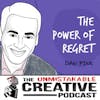Best of 2022: Dan Pink | The Power of Regret

Unleash the transformative power of regret with Dan Pink on Unmistakable Creative. This episode delves into the profound insights of Dan Pink, a renowned author, and speaker who challenges the conventional wisdom about regret. Pink's unique perspective on regret as a powerful catalyst for change and growth is a must-listen for anyone seeking to turn their setbacks into stepping stones.
In this enlightening conversation, Dan Pink unravels the often misunderstood emotion of regret. He shares his extensive knowledge and research on how regret, when harnessed correctly, can propel us toward our goals and aspirations. Pink's thought-provoking discussion is not just about understanding regret but about leveraging it to create a more fulfilling and successful life.
Join us on this journey with Dan Pink as we explore the uncharted territories of regret and its potential to transform lives. This episode is a treasure trove of wisdom for those willing to view their regrets not as failures but as opportunities for growth and learning. Tune in to Unmistakable Creative for this riveting episode with Dan Pink, and let the power of regret guide you toward a more empowered future.
Subscribe for ad-free interviews and bonus episodes https://plus.acast.com/s/the-unmistakable-creative-podcast.
Hosted on Acast. See acast.com/privacy for more information.
Candid Conversations: Elevate Your Thinking with Masters of Their Craft
Dive into a realm of transformative conversations, where wisdom from trailblazers who've shattered norms is at your fingertips. Learn from best-selling authors who've decoded productivity, and thought leaders who've sculpted the landscape of personal and professional growth. Unearth the secrets of successful entrepreneurs, delve into the science of habits, and explore the art of charisma. Each conversation is a journey, brimming with unexpected insights and practical wisdom that will ignite you











